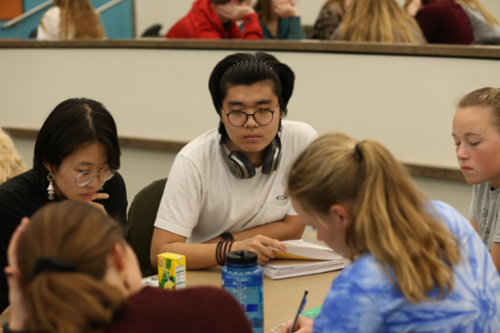Teaching & Learning
Goal
- Prepare students for tomorrow's world with breadth and depth of learning programs, academic excellence, innovative teaching, comprehensive curricular content and experiential learning.

Key Characteristics
- Access-to-success for students recruited from all walks of life through teaching and learning with innovative approaches and comprehensive curricula for premier undergraduate, graduate, postgraduate and professional programs.
- Diverse opportunities for experiential learning complementing curricular programs with field experiences, global awareness and exposure to societal challenges.
- Integration of educational and personal growth — educating the "whole" student with academic, professional, civic and personal growth — developing leadership to make a difference in the world.
- A community of engaged faculty and staff that strives for excellence in teaching and learning, improved student outcomes and innovations with peer-recognized research and scholarship.
- Excellence in academic support, services and facilities — educational affordability, academic and career advising with mentoring, teaching/learning facilities and support for well-being that help fulfill the promises of a transformational education.
Key Strategic Initiatives
- Attract, recruit, retain and promote success of a diverse group of students (including underrepresented, underprivileged, nontraditional, multicultural, urban and rural).
- Provide academic and financial support to students from diverse backgrounds.
- Promote and support faculty and staff development, and provide access to training for teaching/learning and academic support services.
- Utilize PK-12 engagement as a pre-recruitment strategy to build relationships with students and strengthen the educational pipeline to Purdue and higher education.
- Ensure that students are supported in areas of academic and professional development, as well as overall well-being attending to food security, physical and mental health, and cultural acclimation.
- Develop cutting-edge curricula with comprehensive content, up-to-date teaching and learning methods, flexibility, openness to new ideas and a wide range of experiential learning opportunities for students (e.g., study abroad, service learning, leadership development, undergraduate research, conference participation, Department and College-level representation, and other extra-/co-curricular activities).
- Be a preferred university for industry employers in terms of jobs and internship placement, academic and leadership programs, and support through Agricultural Advancement.
- Attract, retain and promote world-class faculty and staff to support teaching, advising and learning initiatives.
- Provide resources to faculty, staff and teaching assistants to allow for further educational development and learning new areas and teaching techniques.
- Reach out to all students with the opportunity to connect with faculty mentors outside the classroom and alumni mentors for career/professional development.
- Expand online course offerings and programs, attending to learning disabilities (e.g., hearing-impaired) to make them widely available to a variety of clientele.
- Ensure a breadth of career services in partnership with the University's Center for Career Opportunities (CCO) for both general fields in agriculture and specialized careers aligned with the students' majors.